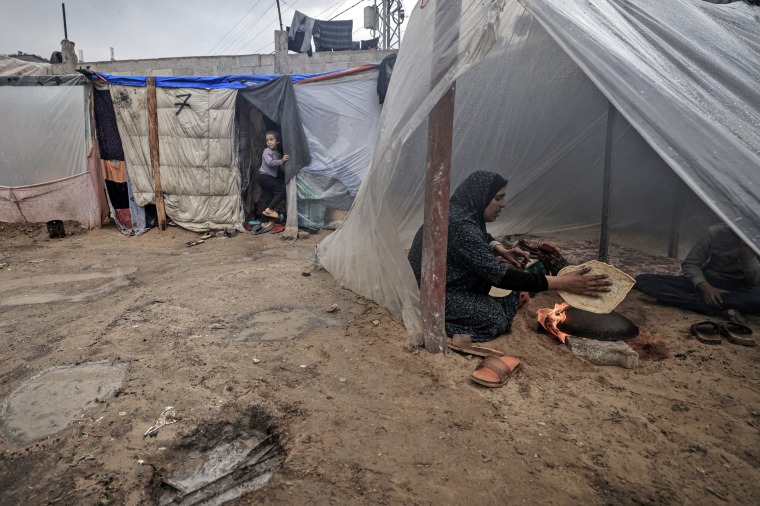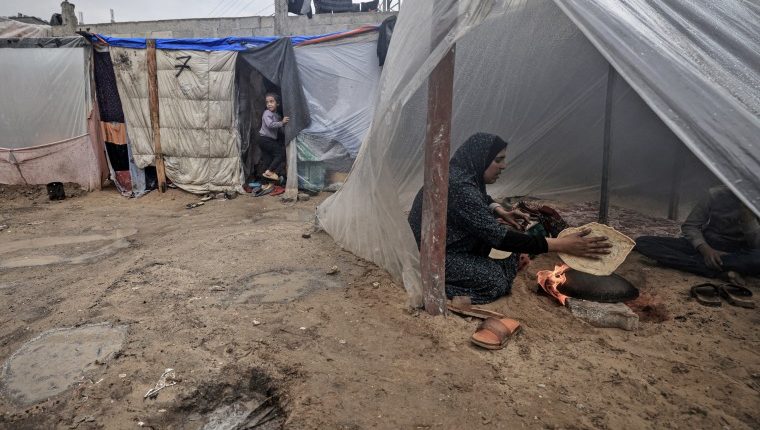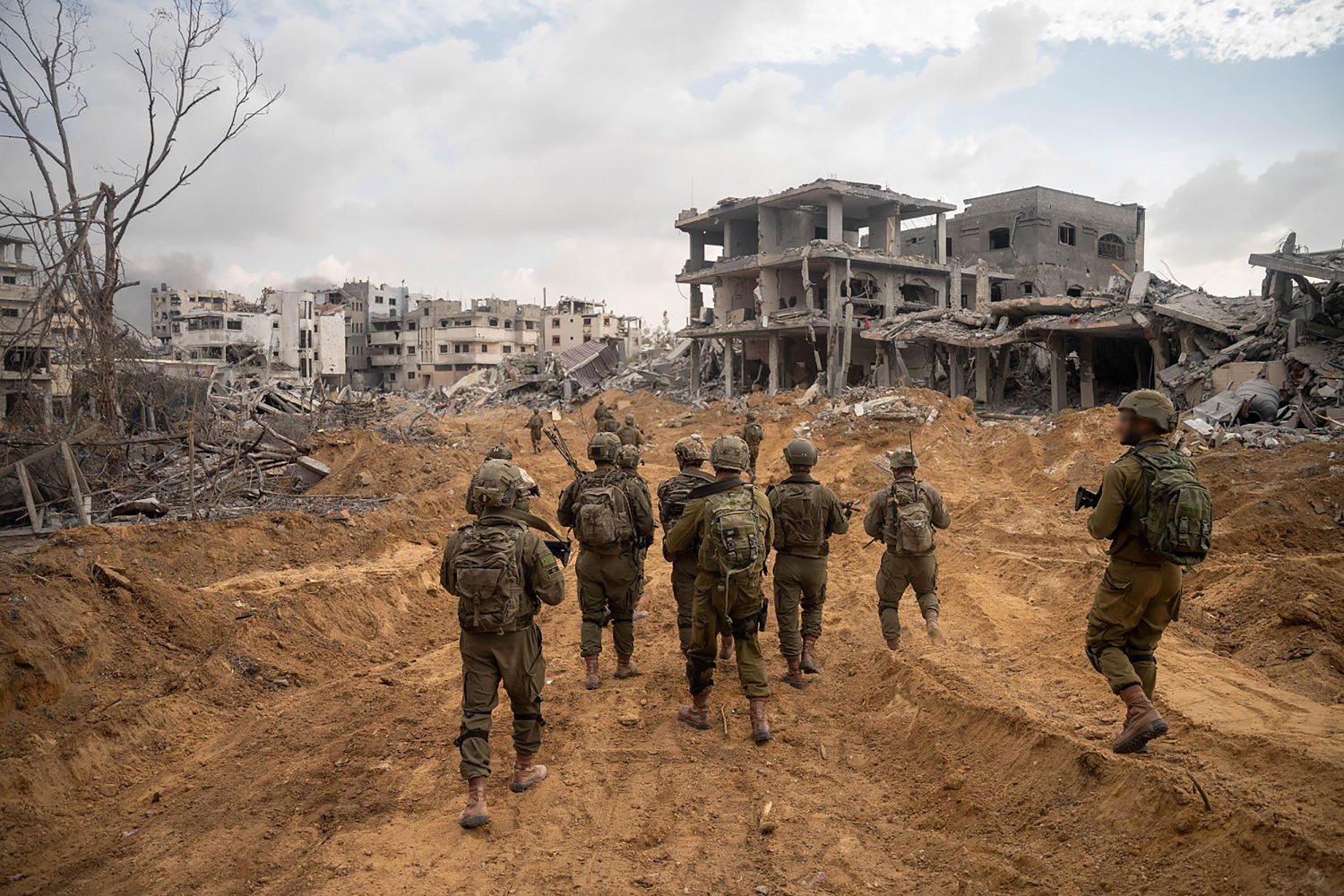Facing accusations of genocide against Palestinians in Gaza, Israel is preparing to defend itself this week at the United Nations’ top court in a high-profile legal battle that comes at a decisive time during its military campaign after Hamas’ Oct. 7 terror attacks.
The courtroom charge is led by South Africa, a staunch Israel critic, which has filed a case to be heard at the U.N.’s International Court of Justice starting Thursday and Friday.
Its 84-page legal filing accuses Israel of acting since Oct. 7 — killing, injuring and displacing Palestinian civilians, and denying them food, water and other essentials — in a way that’s “intended to bring about the destruction of a substantial part of the Palestinian national, racial and ethnic group.”
The court, known as the ICJ, is composed of 15 judges, who will hear oral arguments from lawyers representing South Africa and Israel. The hearings will be streamed live on the court’s website, and the room itself has space for around 30 journalists to attend in person.
The ICJ case has huge significance politically, legally and in the court of public opinion. Its rulings are binding under international law, and both Israel and South Africa are party to its decisions — but some countries, including Russia and indeed the United States, have ignored or rejected them in the past.
The court has no power to enforce the rulings, but it can deal a reputational blow.
The case “is also a battle on the historical narrative, which can shape views on the Israel-Palestinian conflict,” Eliav Lieblich, an international law professor at Tel Aviv University, said.
Israel has vowed to fight back at the hearings. The country is still reeling from the Oct. 7 attack in which hundreds of civilians were killed, including 300 partygoers at the Nova music festival, and some 240 hostages were seized in an attack that also appeared to include dozens of instances of sexual violence, according to evidence reviewed by NBC News.
Recent comments by some senior right-wing members of Prime Minister Benjamin Netanyahu’s government calling for people in Gaza to be moved out of the enclave and effectively replaced by Israeli settlers may play a role in the proceedings.
They see the war as an “opportunity to concentrate on encouraging the migration of the residents of Gaza,” as Itamar Ben-Gvir, the country’s national security minister, put it last week.
These comments have not been reflected in official Israeli proposals that call for neither itself nor Hamas to run Gaza. But nevertheless international law experts say they do not help Israel’s argument in court.
Follow live coverage from NBC News here
Israeli government spokesman Eylon Levy said last week that South Africa was “criminally complicit,” that it had “openly aligned itself with the Hamas rapist regime,” and that it was itself “aiding and abetting that machinery of genocide.” He also dismissed the filing as “an absurd blood libel” — the ancient antisemitic conspiracy theory that Jews use non-Jews’ blood for rituals.
Israeli President Isaac Herzog said on Tuesday that “there is nothing more atrocious and preposterous” than the accusations of genocide against Israel.
The case rests on a central disagreement over Israel’s war in the Gaza Strip, which has killed more than 23,000 people, including upward of 7,000 children, according to the health ministry in the Hamas-run enclave, whose figures U.S. and U.N. officials say are accurate. More than 59,000 have been injured in the Israeli strikes, and thousands more are missing and presumed dead.
Israel says it only wants to topple Hamas, the Palestinian militant group that runs Gaza. The government and many Israelis see this as essential to guarantee their security after what they, and international law experts such as Shelly Aviv Yeini, a postdoctoral fellow specializing in international law at Israel’s University of Haifa, say was itself a “genocidal attack” by Hamas on Oct. 7.
Hamas’ charter calls for the destruction of Israel, and its assault was “an attack committed with intent to destroy, in whole or in part, a national, ethnical, racial or religious group, as such by killing members of the group,” she said.
Many Palestinians, meanwhile, disagree with the official Israeli rationale for the war, which they see as another attempt by Israel to remove them from their land, itself a refuge after many of them fled there during the 1948 Nakba, meaning “catastrophe,” in which an estimated 750,000 Palestinians were forced to flee their homes during the founding of the state of Israel.
“That’s what Israel’s plan is — they might not say it,” said Mohammad Ghalayini, 44, an air quality scientist who lives in the southern Gaza city of Khan Younis. “Israel plans to make the Gaza Strip uninhabitable, to push the Palestinians out.”

A verdict could take years to reach, and “international law is infamous for its lack of strong enforcement mechanisms,” according to Lieblich at Tel Aviv University.. But long before any ruling comes out, South Africa has asked the ICJ to call for “Israel immediately to halt all military attacks that constitute or give rise to violations of the Genocide Convention.” This would be binding under international law but states can and have ignored these directives, as Russia did with a similar ICJ order in 2022 to pause its war in Ukraine.
While South Africa has focused on Palestinian civilians being killed in the war, another subplot has been developing: Ultraconservative and ultrareligious members of the Israeli government have been calling for Palestinians to be relocated out of Gaza into neighboring Arab states.
Supporters of this idea say they only want to move Palestinians who want to leave; critics and legal experts say it’s not a voluntary choice if war has made their home uninhabitable.
Chief among proponents of this view is Ben-Gvir, the country’s national security minister, who told a party meeting last week that the war was an “opportunity to concentrate on encouraging the migration of the residents of Gaza,” according to the Times of Israel and other local media.
He has made similar comments before, and doubled down when challenged.
But Ben-Gvir’s remarks have been denounced by the U.S. and other governments, and condemned by human rights watchers as tantamount to supporting war crimes. The concept of Palestinians being driven from Gaza has been condemned as “forced displacement” and therefore a “crime against humanity” by Francesca Albanese, the U.N.’s special rapporteur on the occupied Palestinian territories, and other international human rights watchers.
Ben-Gvir’s comments, according to Yeini at the University of Haifa, are “irresponsible” and “unhelpful” to Israel’s case and come as the Jewish state is trying to show the world and the U.N.court that it is abiding by international law.
It is “a matter of some dispute” among international law experts whether forced displacement constitutes genocide, according to David J. Simon, director of the genocide studies program at Yale University. But, he says, he wouldn’t be surprised if South Africa uses comments by Ben-Gvir and Finance Minister Bezalel Smotrich to bolster its case.
“I think that we have to solve the problem of Gaza and to rehabilitate its residents” in other countries, Smotrich told Army Radio last week.
Ben-Gvir added that Jews should move back into Gaza, an area Israel occupied from 1967 to 2005.
“Not only do I not rule out Jewish settlement” in Gaza, he said last week, “I believe it is also an important thing.”

Netanyahu has distanced himself from these comments, saying he has no plans to stay in Gaza after the war. The Cabinet is discussing plans for who should run the enclave next, according to an Israeli official. And Defense Minister Yoav Gallant said in an official proposal Thursday that neither Israel nor Hamas but Palestinian “bodies” would run the enclave — without going into detail. The proposal made no reference to displacement.
The political parties headed by Ben-Gvir and Smotrich only received a combined 10% of the vote in elections last year. And while they are not directly involved in steering the war effort in Gaza, they are given outsize influence because Netanyahu enlisted them in his coalition government in a pact to regain power — and critics, say, avoid prosecution in his ongoing trial on allegations of fraud and other charges, which he denies.
But such talk is not confined to these fringes. Senior members of Netanyahu’s own right-wing Likud party, including Intelligence Minister Gila Gamliel, have floated similar suggestions in the past.
And although the mass expulsion of Palestinians might be a niche position, the idea of Israel resettling Gaza is not. A poll by the Channel 12 broadcaster in November found 32% of people support re-establishing Israeli communities in the enclave from which they were removed almost 20 years ago.
These politicians say any relocation of Palestinians would be voluntary. But “there is no such thing as ‘voluntary resettlement’ under conditions of duress,” Lieblich and other experts have pointed out. Instead, these are “indeed calls for the commission of international crimes,” he said, and “the Israeli government must unequivocally declare that they do not represent its official policy.”
Asked by NBC News to comment on whether calls to resettle Palestinians would hurt Israel’s case at the ICJ, a spokesman for the Foreign Affairs Ministry said, “This is not the official position or policy of the Israeli government.”
NBC News has contacted the offices of Ben-Gvir and Smotrich requesting comment on the widespread condemnation of their remarks, and the allegation that they endorse war crimes.
Smotrich responded in a message by saying that “allowing those who wish to leave Gaza to leave is a humanitarian step.” He said that “Hamas has turned Gaza into a prison of terror” and “those who wish not to be in a prison … deserve to be helped.”
Their comments have also caused added friction with the U.S., Israel’s closest ally that gives it $3 billion a year in military aid but has called for its government and military to do more to reduce civilian deaths.
State Department spokesman Matthew Miller said Wednesday that the ministers’ language was “inflammatory and irresponsible,” leading Ben-Gvir to hit back on X that Israel is “not another star on the American flag.”
On the ICJ case, Miller said at a news briefing later Wednesday that the U.S. was “not seeing any acts that constitute genocide” from Israel.
That does not diminish the case in terms of its potentially huge impacts.
As well as the potential for the ICJ to order an immediate cease-fire, the case could “cause significant reputational harms,” for Israel, Lieblich said, adding that this “can then translate to political pressure, calls for sanctions, calls for restricting arms transfers and so on.”
Source: | This article originally belongs to Nbcnews.com










